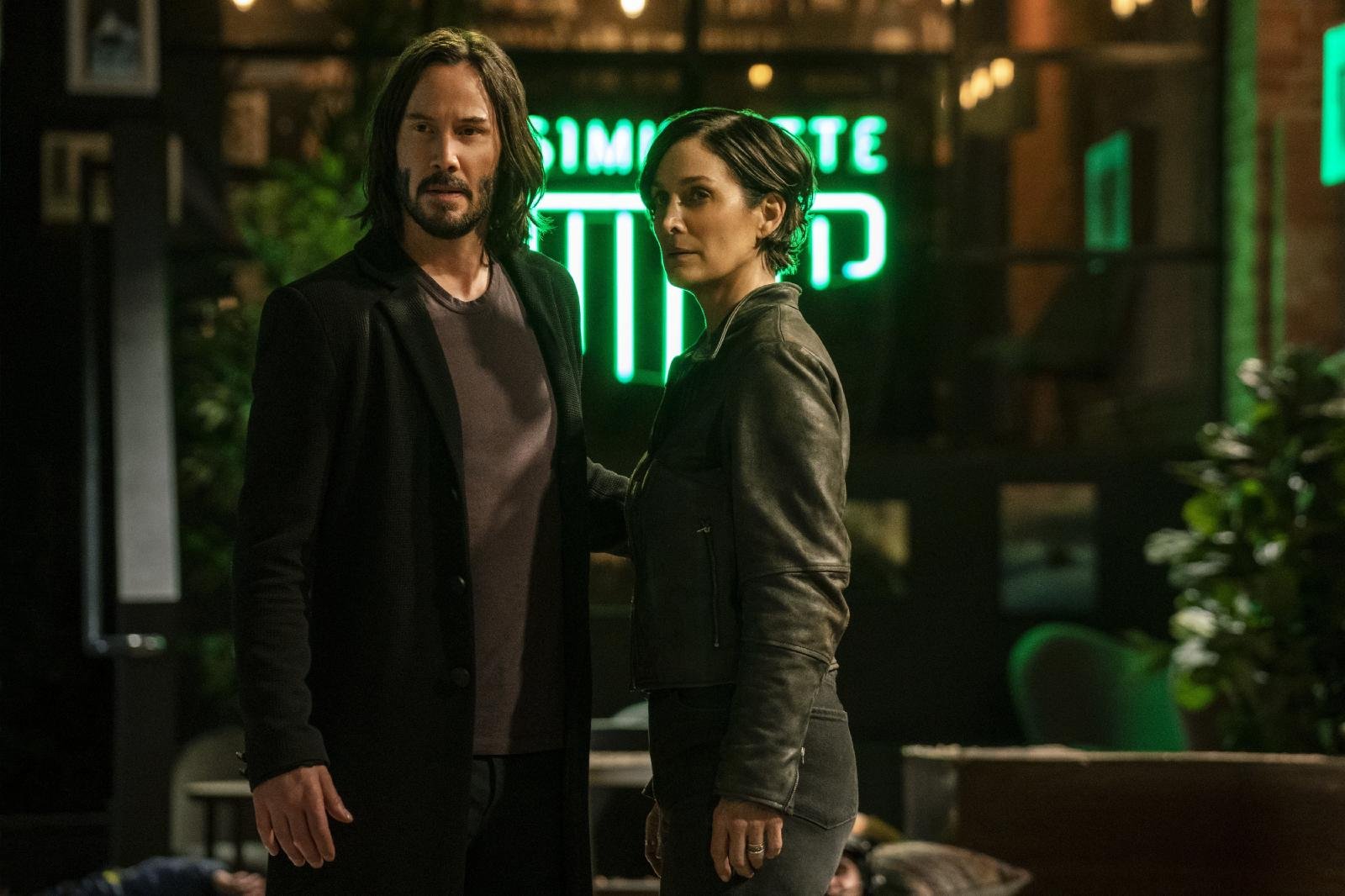Review: The Matrix Resurrections (2021)
Lana Wachowski’s The Matrix Resurrections is a deeply ambivalent work. It’s ambivalent about the notion of being a sequel, as it’s as much a reboot as a proper sequel, neither committing to franchise extension, nor wholly rewriting that which came before. It’s ambivalent about returning to this storyworld and extending the story of Neo and Trinity after it had killed them off and ended their story in 2003, so it spends much of its time revisiting previous events in the franchise. It’s ambivalent about the notion of unlocking a “true reading” of this world, dismissing any specific reading of the series that fans have rallied around, such as you’ll find in movies like A Glitch in the Matrix. It’s even ambivalent about the idea that this is primarily an action franchise, with many fewer action scenes than previous films, and less emphasis on the choreography and wirework that made the series so beloved.
So what is it about then? It’s about love—the love of a creator for her characters, and the love of the characters for each other—and the liberating emotion that underpins the journeys of these characters. It’s a corny, romantic, weird, and mostly interesting work from an idiosyncratic director.
To keep things vague, The Matrix Resurrections finds Neo (Keanu Reeves) living as the successful game designer Thomas Anderson, who is famous for making a trilogy of video games called The Matrix. Sound meta? Oh boy, we’re only getting started. Neo, er, Thomas has been struggling with psychotic delusions and begins to believe that he’s living inside a computer simulation that mirrors the stories of his game. He’s drawn to one woman in particular, a married woman named Trinity—no wait—Tiffany (Carrie-Anne Moss) with a penchant for motorcycles. But when a mysterious stranger named Bugs (Jessica Henwick) and a new-yet-familiar face (Yahya Abdul-Mateen II) show up in his life, he starts to think his delusions may be more real than his analyst (Neil Patrick Harris) lets on.
As you can tell from this scant plot description, The Matrix Resurrections engages head-on with the meaning of the franchise itself. Such a self-reflexive examination is not rare for contemporary sequels of beloved franchises—Star Wars: The Force Awakens and Skyfall, to name two prominent examples, spend much of their runtime examining the meaning and worth of their franchises and storyworlds. But neither of those films make their self-reflection in as explicit a manner as The Matrix Resurrections. This film does not try to smuggle in commentary about the franchise into other philosophical explorations; rather, it makes a direct engagement with the previous films, their meaning, and the choices of the characters a central part of the plot. The result is a film that is shockingly forthright, even if such forthrightness is occasionally clunky.
In the film’s best sequence, a montage set to Jefferson Airplane’s “White Rabbit,” many of Thomas’s designers go to work thinking up a sequel to his famous game trilogy and discuss the core question: “what is The Matrix about?” It’s about free will, identity, trans politics, say some designers. It’s about guns and action and blowing shit up, says another. It’s about choices, says yet another. But Thomas, and by extension, Wachowski, are not satisfied with any of these answers. No, The Matrix Resurrections says that Neo and Trinity’s story is about the lack of real choice, about the illusion of binary thinking, and what it really means to wake up.
Of course, you could say this entire meta approach is simply a clever way of skirting the hollowness of the film writ large and allowing the film to bank on nostalgia while critiquing the emptiness of modern pop cinema. That by making the film a borderline ironic examination of the franchise itself and its meaning, and an investigation of the notion of originality and newness in our current world, Wachowski is detaching herself from any commitment to franchise building and putting herself “above” the material, lest it fail. There’s a literal sequence in the film that discusses what an empty cash grab the whole idea of a “Matrix 4” is, which even name drops Warner Bros.! Surely, all this detached irony is an artistic excuse for cannibalising a beloved IP. But such a reading of the film as ironic doesn’t jar with its heart-on-sleeve emotions and flamboyant proclamations about love and freedom and reinventing yourself.
Because while The Matrix Resurrections is a fascinatingly self-reflexive examination of the franchise and its meaning, it’s also a love story and a character piece. It largely exists to retcon the dramatically unsatisfying ending of The Matrix Revolutions, which killed off Neo and Trinity and saw an armistice between the humans and machines. That ending was deliberately, provocatively non-cathartic. It is fascinating precisely because it moves the story away from the linear and towards the cyclical, as I wrote in 2019. But The Matrix Resurrections shows that even that sort of provocative closure is not allowed in our current pop-culture moment. Franchises cannot end. Characters cannot die. Things are reborn, so even the choice between life and death, between the red pill and the blue pill, is a false choice. It argues that the only things that are real are the emotions we feel. Thus, it’s understandable that the film invests entirely in the romance between Neo and Trinity: about the bond that lies between them and the power of that bond to animate a life that is virtually without meaning.
To this end, it helps that Keanu Reeves and Carrie-Anne Moss have matured into finer actors than they were in the original trilogy. Make no mistake, they remain great in those films, but the maturity and, dare I say, subtlety of their performances in The Matrix Resurrections proves how much they’ve grown over the years. And aged. They remain athletic, beautiful actors, but they show their years and the age looks good on them.
Reeves, with his salt-and-pepper beard, and Moss, with her weary eyes surrounded by crows feet, look their age, perhaps for the first time ever. And that age gives their actions emotional weight. You feel the yearning, the desire for more, the exhaustion at the stagnancy of their situation, which stands in for the trippy synergy between the film’s examination of meaning in a ever-repeating and resurrecting world and our own world where pop-culture is all reboots and sequels and our daily lives are never-ending repeats of March 2020. When Neo and Trinity can finally awaken, unite, and realize their bond, it’s immensely satisfying, not only because it culminates their romance, but because it offers freedom from the mundane.
While The Matrix Resurrections and its romantic climax are more conventionally satisfying than the ending of The Matrix Revolutions, the film does not satisfy in every department. Notably, the action is a great deal worse than in the previous films. The legendary Hong Kong choreographer Yuen Woo-ping did not work on this film, and you really miss his stunning wirework. I didn’t mind the film’s de-emphasis of gunplay—Neo notably never uses a gun in the film—but it never replaces the bravura of the previous films’ shootouts with any single standout sequence. As I said at the outset, Wachowski is not-so interested in this film as an action film, and it shows.
As well, the success of the casting (and recasting) is mixed. Jessica Henwick is a charismatic anchor for the audience as Bugs, offering the point of view in the opening moments and the steadying presence that Morpheus and Trinity offer in the original film. Yahya Abdul-Mateen II has a satisfying swagger and looks killer in an orange or purple suit, but you miss the original actor whenever he’s on screen. Conversely, Jonathan Groff as Thomas’s business partner and Neil Patrick Harris as his analyst are savvy introductions to the world, offering intriguing variations on characters from the original trilogy, while making the roles their own. They truly belong in this world. As for returning cast, the less said about Jada Pinkett Smith, the better.
Not every choice in The Matrix Resurrections works. Some of the philosophical examinations are existentially provocative, even terrifying. Others are a bit dopey. But you appreciate the chutzpah to make a big-budget science-fiction sequel all about the possible emptiness of sequels, futility of finding closure, and emotional frustration of living in never-ending cycles. The great irony of the film is that it does end up being unique and, dare I say, original. It tries something new even while digging into the old. I appreciate that we’re able to get a film as strange and defiantly sentimental in our modern blockbuster landscape, which is defined by a conformity and hollowness that the machines in The Matrix would find admirable.
7 out of 10
The Matrix Resurrections (2021, USA)
Directed by Lana Wachowski; written by Lana Wachowski, David Mitchell, Aleksandar Hemon, based on characters created by the Wachowskis; starring Keanu Reeves, Carrie-Anne Moss, Yahya Abdul-Mateen II, Jessica Henwick, Jonathan Groff, Neil Patrick Harris, Priyanka Chopra Jonas, Jada Pinkett Smith.



Joe Carnahan’s cop thriller starring Matt Damon and Ben Affleck is an enjoyable whodunnit.